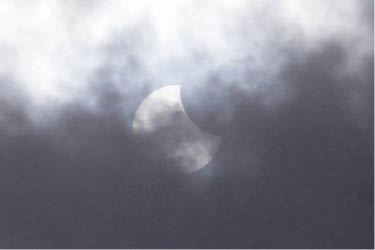Some 20,000 people gathered under a cloudless sky in the North West Australian coastal town of Exmouth to enjoy a rare total solar eclipse that plunged the region into darkness for 58 seconds as the moon blocked out the sun.
The remote town, with fewer than 3,000 residents, is one of the best vantage points in Australia to see the eclipse that also crossed Indonesia and East Timor.
An international crowd had been gathering in Exmouth for days, camping in tents and trailers on a red, dusty plain on the edge of the town with cameras and other viewing equipment pointed to the sky.
“Many people become addicted to that minute or so of eerie otherworldliness.
Bandits kill many vigilantes in Niger
FG inaugurates safety, hazard control c’ttee
“They become ‘eclipse chasers’ and they travel all over the world for repeat experiences,” said John Lattanzio of the Astronomical Society of Australia.
The total occurred at 11:29:48 local time (03:29:48 GMT), bringing darkness and a spectral calm, according to those who were there.
Less than a minute later, the dusty outback was again bathed in light.
NASA astronomer, Henry Throop, was among those in Exmouth, loudly cheering the eclipse in the darkness.
“Isn’t it incredible? This is so fantastic. It was mind-blowing. It was so sharp and it was so bright. You could see the corona around the sun there,” the visibly excited Washington DC resident told the Australian Broadcasting Corporation.
People in West Papua and East Timor were also able to witness the total eclipse.
In the Indonesian capital, hundreds flocked to the Jakarta Planetarium to watch the partial eclipse, which was obscured by clouds.
Azka Azzahra (21) came with her sister and friends to get a closer look by using the planetarium’s telescopes.
“I am still happy to come even though it is cloudy. It is good to see how people with high enthusiasm come here to see the eclipse, because it is rare,” Azzahra said.
The call to prayer resounded from the city’s mosques when the eclipse phase began as Muslims said eclipse prayers as a reminder of God’s greatness.
The hybrid solar eclipse was mostly over water as it tracked from the Indian Ocean to the Pacific Ocean. The few people in its path either saw the darkness of a total eclipse or a “ring of fire” as the sun peeked from behind the new moon.
The eclipse also gave scientists a chance to observe the sun’s corona, which is usually obscured by its bright rays.
Millions gather across US, Mexico, Canada for eclipse
Undeterred by gloomy forecasts of low cloud cover and rain spoiling their view, hoards assembled in the US from Texas to Maine, clutching safety glasses and cameras with solar filters in readiness for the rare spectacle.
More than 31 million people live in the “path of totality” – the track of the moon’s shadow blocking the sun – that the eclipse will follow in a North East direction for about an hour after crossing into Texas at 1.30pm CT.
And officials say they expect another four to five million to journey in, bringing an estimated $1.5bn tourism boost from what will be the country’s biggest travel day of the year.
Travellers were up early on Monday to stake a good spot for watching the eclipse beneath the 115-mile wide path of totality. In Maine, where clear skies are expected to offer some of the best views, authorities reported heavy traffic long before daylight.
“We really didn’t even dare to hope that we would have weather like this, and the sky is blue and the crowds are actually beginning to form and it’s only quarter to six in the morning. This is the biggest thing we’ve ever seen,” Jane Torres, Executive Director of the Houlton Chamber of Commerce, told CNN’s This Morning.
Sarah Laneau, of Westfield, Vermont, woke at 4am to take her 16-year-old daughter on a ski tram to the top of a mountain at the nearby Jay Peak Resort to watch the eclipse at an elevation of 3,968ft.
“This will be a first for me and an experience of a lifetime,” Laneau (57) said.
Forecasters had gloomier news for many other parts of the country, although predicted conditions had been generally trending better in recent days. Clouds were still expected across much of the eclipse route, with severe weather, including thunderstorms and hail, for parts of Texas, Oklahoma, Arkansas and Louisiana later in the day.
“Northern New England remains to be the region where cloud cover will likely be minimised along the path of totality this afternoon,” the National Weather Service said in a Monday morning bulletin.
Almost everywhere in North America will experience a partial eclipse of varying percentages depending on the proximity to its centre track.
Such is the interest in the eclipse that numerous states and municipalities have declared state of emergency in expectation of massive crowds.
At several zoos, researchers were joining citizen observers to watch how animals behaved. During previous eclipses, giraffes ran around frantically, tortoises started rutting and gibbons sang and barked.
Sources: Aljazeera and The Guardian newspaper

 Join Daily Trust WhatsApp Community For Quick Access To News and Happenings Around You.
Join Daily Trust WhatsApp Community For Quick Access To News and Happenings Around You.


